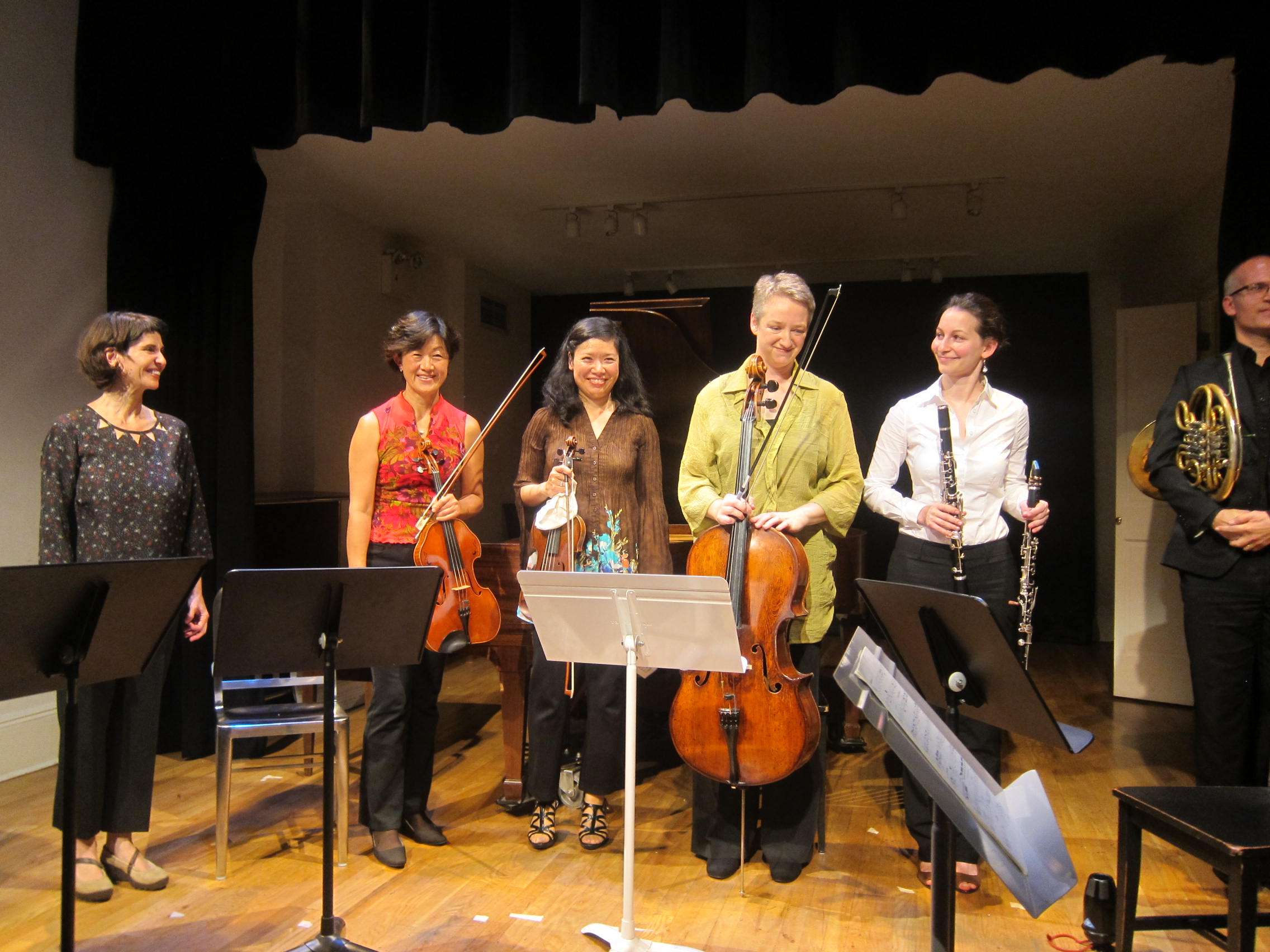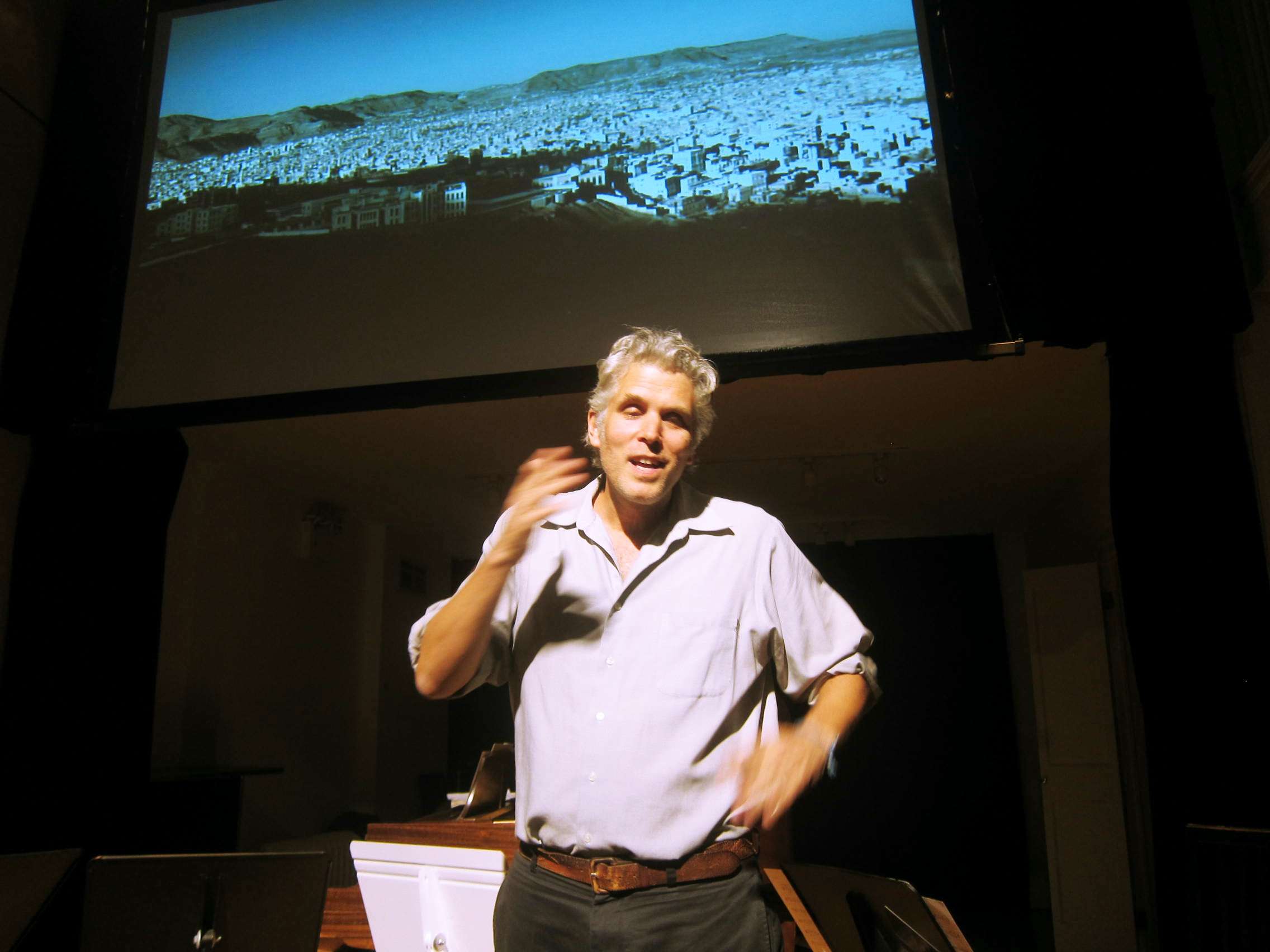|
Back
They sing of war... New York
The Cell, 338 West. 23rd Street
10/12/2013 -
Philip Miller: Can You Hear That? for Piano, violin, viola, cello, clarinet and electronics
John Harbison: Abu Ghraib, for cello and piano
Kristin Norderval: Elegy for Gaza, for accordion, trombone, violin, voice and electronics
Krzysztof Penderecki: Sextet, for piano, clarinet, French horn, violin, cello and viola
David Riker, Jeremy Scahill: Excerpts from the documentary Dirty Wars
William Lang (Trombone), Ahlin Neu (Viola), Ensemble Pi: Kristin Norderval (Soprano), Airi Yoshioka (Violin), Karl Kremer (French horn), Katie Schlaikjer (Cello), Moran Katz (Clarinet), Idith Meshulam (Founder and Artistic Director; Piano/Accordion)
David Riker (Speaker)

Ensemble Pi (© Coco T. Dog)
“I sing of warfare and a man of war,” sung Virgil eight centuries ago. And while Ensemble Pi annually sings of peace when the anniversary of our Iraqi invasion comes along, the music is of war and agony. Whether it be from poems about Israeli bombs and the agonies of Gaza, or the torture chambers of Abu Ghraib or the sounds of American war-makers or the more generic psychology of battle, the “Eighth Annual Concert for Peace” last night, Marking the 10th Anniversary of the Invasion of Iraq, displayed more the dissonance of war than the harmonies of peace.
Then again, the rule of media–whether quotidian journalism or 23rd Street music–is that horror sells. Nobody in the audience at The Cell would have been as emotionally involved had Ensemble π played harp lullabies and John Lennon anodynes. Instead we needed the discords, the microtones, the shattering chords of pain.
And this was composed with agonizing literalness by John Harbison in Abu Ghraib with Katie Schlaikjer’s doleful cello and Idith Meshulam’s piano. The first movement, starting with a cello solo, ventures into an anguished “prayer”, this with constant microtonal dissonances, with vague harmonies, with sudden striking chords. It was a shaking experience, which made the almost jaunty song of the second movement–something like a Martinů chorale–seem, if not haunting, at least out of place.
I was unnerved by it until reading Mr. Harbison’s program notes, explaining that this was an Iraqi lullaby which he had transcribed in 1962 for “American family-sing form.” Lullabies, as we know, can also be dirges, and this was indeed a lament for a world, (in Mr. Harbison’s words) “where we may find courage to face out shadow.”
Two other works used a complexity of words to complete their “peace message.” Soprano Kristin Norderval had composed Elegy for Gaza for herself and Ensemble Pi, based on a poem by Timothy Donnelly, as well as a poem by Mahmoud Dawish written during the Israeli siege of the city of Ramallah. Both are haunting, the saturnine combination of trombone and accordion was effective, and while the deft Ms. Norderval’s voice was rarely heard among the sounds of the ensemble, the poem, in the program was harrowing. “We appall ourselves,” he writes, “we disgust and annoys into those we become, we who seek to destroy us.”
The other vocal work was the amorphous Can You Hear That?, written during the American invasion. The eponymous question was asked first by the narrator, then a child, then almost unheard voices by Bush and Runsfeld denying Abu Ghraib. And while I suppose that Abu Ghraib was emblematic of this war, Abu Ghraib was as much as Auschwitz was an inevitability of Hitler’s xenophobia.
The most accomplished work needed no titles or words. Krzysztof Penderecki’s innocently named Sextet, one of his only chamber works, echoed well Shostakovich’s quartets quoting songs of the Jewish shtetels. The first movement was cheeky, arrogant, spiky, easily heard, and one wondered why it was in this “peace” concert. It was the Larghetto, where the bleakness, the emptiness, the shrill calls from clarinet, horns and strings, were apparent. A long movement, one with no program yet with earnest black feelings.

D. Riker (© Coco T. Dog)
Yet was one insoluble problem remained in this celebration of death and agony. A musical reproduction of agony is exactly that. A reproduction, a facsimile, a Platonic cave-shadow, a harmless simulation of reality. David Riker, the co-writer of Dirty Wars, while praising the moods the Penderecki piece, knew that the verisimilitude of the music could never compete with the real death, the real lies, the physical mortalities of his film.
His short talk and q & a session was prefaced with the “nausea” and “anger” he felt while making Dirty Wars. That was a feeling about an entire American context, a possibly desensitization of American modalities. And at least to this listener, it went far deeper than music can ever plumb.
One could never doubt the sincerity of the audience or the ensemble or the composers who participated last night at The Cell. Nor could one doubt, as Plato well knew, that music can rouse and excite and enthuse forces both military and pacific. Yet the these ten years since the invasion of Iraq and the still-unfinished Afghan war, the Special Forces invasion, less than a week ago, of Somalia and Libya, the daily drone flights over Yemen and Pakistan, can never be absolved by Harbison’s microtones and lullabies or Norderval’s improvisatory singing of deeply felt poems.
All lauds to Ensemble π for their efforts. One only hopes that in their ninth “Peace Concert”, the inconceivable occurs, giving us fewer rapacious requiems and more human hosannas.
Harry Rolnick
|